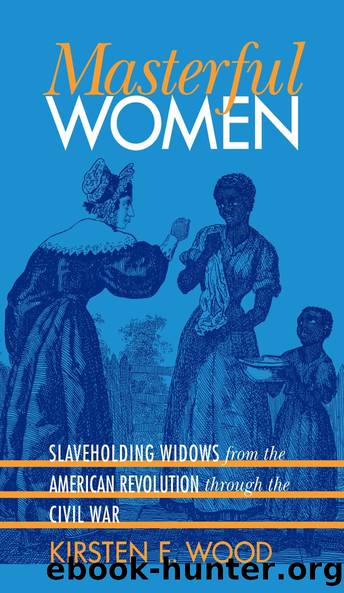Masterful Women by Kirsten E. Wood

Author:Kirsten E. Wood [Wood, Kirsten E.]
Language: eng
Format: epub
ISBN: 9780807855287
Barnesnoble:
Publisher: The University of North Carolina Press
Published: 2004-06-21T00:00:00+00:00
WHEN ADA BACOT left her fatherâs house in the spring of 1861 to return to her own plantation, she confronted the unhappy difference between her present and her past. She recalled that, when she first went to Arnmore, âtwas to be the mistress of the house a loving husband provided.â Returning four years after he died, she knew that âI shall be constantly reminded of my former life there, under how different circumstances do I now go there. Memory carrys me back to the happy time, & fills my eyes with tears.â While Bacot half-expected the dead to haunt her, she also feared that she would be âlonly.â Yet being at Arnmore had some consolations. Ten days after moving, she âbegan to feel quite settled alredy, & I dont think I am to be so lonly as every one predicts.â She added sagely, âIf I am twill not be because Iâve not a plenty of work.â39 Keeping busy in oneâs own household had a great deal to commend it, especially for a woman like Bacot who could not comfortably live with her closest relations. Householders could also take pride in successful harvests, and those who, like Lucy Freeman, finally made ends meet after years of struggle likely felt a particular satisfaction. Living in comparatively âindependent circumstancesâ did not, however, automatically assuage widowsâ feelings of uselessness and insignificance although it did keep at bay the ignominy of dependence.40
Even the busiest widow sometimes questioned the value of her labors. Executing her husbandâs estate, supervising a farm in Georgia, raising her daughters, advising her extended family, and absentee-managing a plantation in Alabama kept Martha Jackson occupied but not necessarily cheerful. Particularly depressing were the abysmally low cotton prices, which made her doubt she could ever pay off her debts. After three years, she mused that she might be better off dead; then, she would cease to be a burden to her family and could join her husband in heaven. Jacksonâs relations scolded her for such gloom, insisting that âyour day of usefulness is not passed,â and indeed she remained an important resource to her family until shortly before her death in 1853. Her relationsâ reliance on her, and their ardent affirmation that her âadvice and counsel is still needed,â lifted her spirits only temporarily, however, and she continued to need such reassurances until she died.41 At Arnmore, meanwhile, Ada Bacot learned that being âmy own mistressâ did not abate her feelings of worthlessness. Similarly, Keziah Brevardâs diary documents an impressive degree of managerial and hands-on work in and around her household, yet she felt that âif I had been torpid all my life I would have been as useful.â Shortly before her fifty-eighth birthday, she again mused, âIf I had been a useful woman these many years what a happiness âtwould be to take a retrospect of themâI cannot see what I have done to any one or in any cause to make me feel I have been useful in my generation.â42
Childlessness exacerbated the insecurities of women like Keziah Brevard and Ada Bacot.
Download
This site does not store any files on its server. We only index and link to content provided by other sites. Please contact the content providers to delete copyright contents if any and email us, we'll remove relevant links or contents immediately.
In Cold Blood by Truman Capote(3362)
The Innovators: How a Group of Hackers, Geniuses, and Geeks Created the Digital Revolution by Walter Isaacson(3098)
Steve Jobs by Walter Isaacson(2875)
All the President's Men by Carl Bernstein & Bob Woodward(2357)
Lonely Planet New York City by Lonely Planet(2204)
And the Band Played On by Randy Shilts(2178)
The Room Where It Happened by John Bolton;(2140)
The Poisoner's Handbook by Deborah Blum(2123)
The Innovators by Walter Isaacson(2087)
The Murder of Marilyn Monroe by Jay Margolis(2085)
Lincoln by David Herbert Donald(1974)
A Colony in a Nation by Chris Hayes(1912)
Being George Washington by Beck Glenn(1861)
Under the Banner of Heaven: A Story of Violent Faith by Jon Krakauer(1778)
Amelia Earhart by Doris L. Rich(1680)
The Unsettlers by Mark Sundeen(1673)
Dirt by Bill Buford(1659)
Birdmen by Lawrence Goldstone(1649)
Zeitoun by Dave Eggers(1630)
